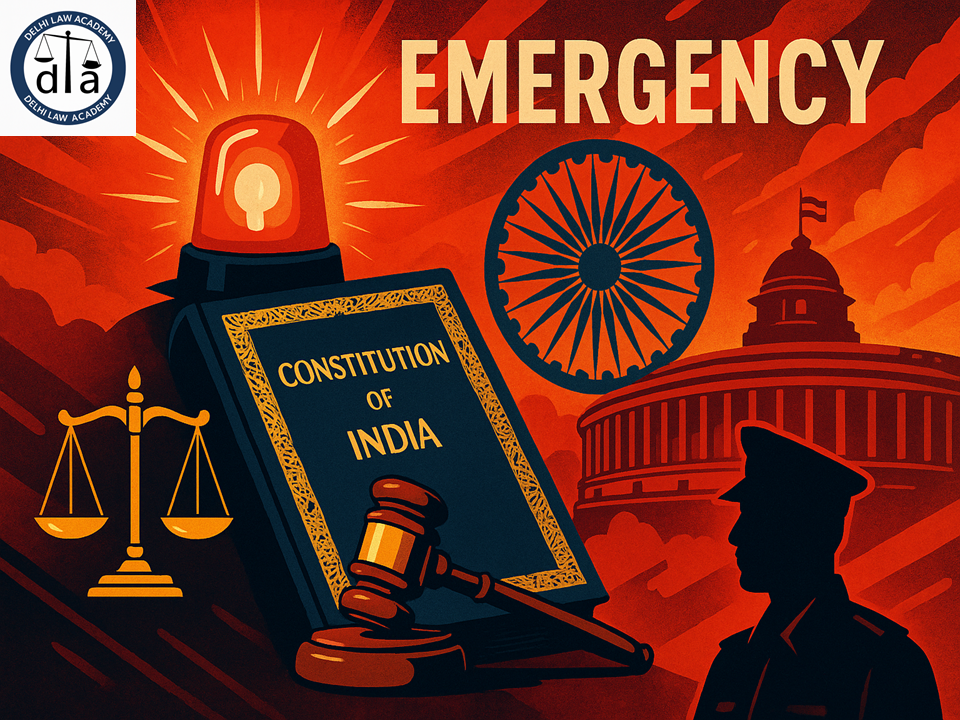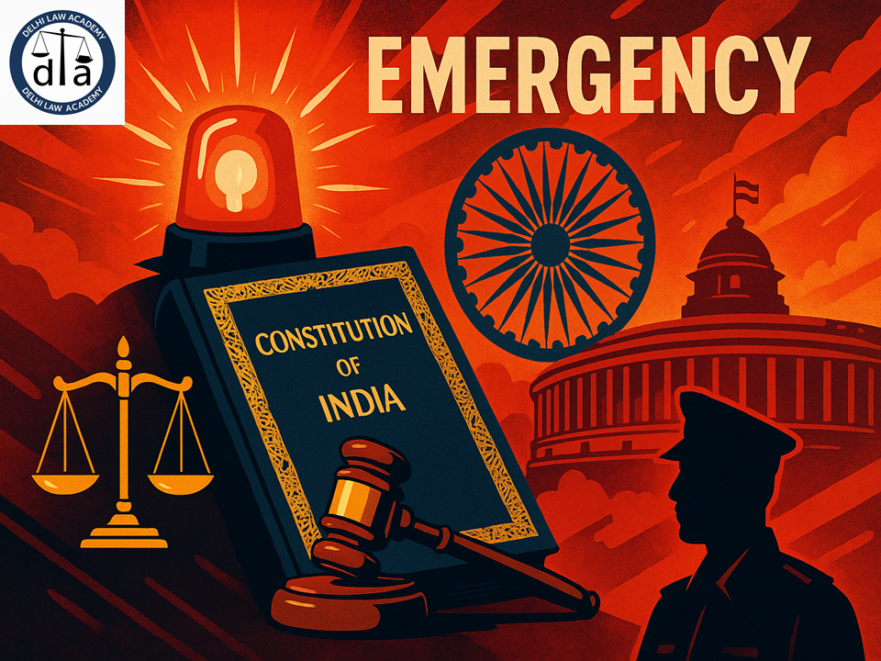
📕 Emergency Provisions in India
Topics:
- 📌 Emergency Provisions
- 📌 Changes made in Article 352 by the 44th Amendment
- 📌 Effect of Proclamation of Emergency on Fundamental Rights
- 📌 Effect of Proclamation of Emergency on Financial relations
- 📌 Effect of Proclamation of Emergency on Legislative relations
- 📌 Effect of Proclamation of Emergency on Executive relations
Delhi Law Academy Jaipur presents below for aspirants of RJS, DJS, PCS(J) and other Judicial Services throughout India a very useful compilation of Emergency provisions scattered over different articles; from Articles 352 to 359 and 250 of our Constitution.
📖 Article 352 – Proclamation of Emergency
Clause 1 – Proclamation
- If President is satisfied that a grave emergency exists whereby security of India or any part is threatened
- He may make a declaration to that effect, by a Proclamation
Grounds:
- War, external aggression or armed rebellion
- Imminent danger of war, external aggression or armed rebellion
Clause 2 – Revocation
- By President, at any time
Clause 3 – Pre-condition for Proclamation
- Cabinet’s recommendation in writing
Clause 4 – Validity of Proclamation
- Valid only for one month unless approved by both Houses of Parliament in the meantime
- If House of People is not in existence – Proclamation needs to be approved only by Council of States
- As and when House of People is reconstituted – Proclamation needs to be approved by it within 30 days
Clause 5 – Validity of Parliamentary approval
- 6 months from the date of resolution by the second House
- Subsequent approvals valid for further 6 months – continues indefinitely
Clause 6 – Special Parliamentary Majority required
- Majority of total membership of House
- Not less than 2/3rd majority of members present and voting
Clause 7 – Lok Sabha can ask for Revocation
- By simple majority
Clause 8 – Requisition of special sitting
- Through a notice by 1/10th members of the House of People
Clause 9 – Different proclamations on different grounds may co-exist
⚖️ Changes made in Article 352
By the 42nd Amendment
- Emergency can be imposed in a part of India too
By the 44th Amendment
- ‘Armed Rebellion’ has been substituted in place of ‘internal disturbance’
- Written recommendation from Cabinet made a pre-condition
- Initial validity reduced from 2 months to 1 month
- Parliamentary approval essential every 6 months
- Lok Sabha empowered to ask for revocation by a simple majority
📌 Consequences of Emergency (Articles 353, 250, 354, 358, 359)
Article 353 – Effect on Executive relations
- Executive power of Union shall extend to giving directions to any State on how to exercise State executive power
Article 250 – Effect on Legislative relations
- Parliament gets authority to enact laws on any State List subject
Article 354 – Effect on Financial relations
- President may direct that Articles 268 to 279 shall have effect subject to modifications
- This order shall not extend beyond the financial year in which Emergency ends
Article 358 – Effect on Article 19
- State can make any law or take any executive action in violation of Article 19
- Any law so made shall cease to have effect as soon as Emergency ceases
Law to contain a recital:
- Applies only if law contains a recital linking it to Emergency
- Does not apply to any executive action otherwise
✔️ This requirement was inserted by the 44th Amendment in 1978
Article 359 – Effect on Fundamental Rights
- President may by order declare that the right to move any court for enforcement of specified Part III rights shall remain suspended
- This shall not apply to rights under Articles 20 and 21
Effect of Order:
- State can make any law or take any executive action in violation of Part III rights
- Such law shall cease to have effect as soon as the order ceases
Law to contain a recital:
- Applies only if law contains a recital linking it to Emergency
- Applies only to executive action under such law
✔️ This requirement was also inserted by the 44th Amendment in 1978
📖 Continue the Series
Don’t stop here! Learn more about Emergency Provisions in India in our next parts:
📚 Further Reading for Law Aspirants
Explore more useful resources from Delhi Law Academy to strengthen your preparation:
❓ FAQs on Emergency Provisions in India
📌 What is Article 352 in the Indian Constitution? ➕
Article 352 deals with the Proclamation of Emergency. It allows the President to declare an emergency in case of war, external aggression, or armed rebellion. It also specifies the process, validity, and parliamentary approvals required for such a proclamation.
📌 What changes were made to Article 352 by the 44th Amendment? ➕
- ‘Armed Rebellion’ replaced ‘internal disturbance’ as a ground.
- Written recommendation from Cabinet is a pre-condition.
- Initial validity reduced from 2 months to 1 month.
- Parliamentary approval is required every 6 months.
- Lok Sabha empowered to ask for revocation by a simple majority.
📌 How does Emergency affect Fundamental Rights? ➕
During an emergency, the President can suspend the enforcement of specified Part III rights (except Articles 20 and 21). Laws or executive actions violating these rights are valid only during the operation of such an order and must contain a recital linking them to the emergency.
📌 How does Emergency affect Financial relations? ➕
While Emergency is in operation, the President can direct modifications to Articles 268 to 279. Such modifications do not extend beyond the financial year in which the emergency ends.
📌 How does Emergency affect Legislative relations? ➕
Parliament gains authority to enact laws on any State List subject during an emergency, giving it wider legislative powers over states than under normal circumstances.
📌 How does Emergency affect Executive relations? ➕
During an emergency, the executive power of the Union extends to giving directions to any State on how to exercise its executive powers, increasing central control over state administrations.
Contact us
📍 Delhi Law Academy – Jaipur Branch
6C, Tower 2, Coaching Hub, Pratap Nagar, Jaipur – 302033
📞 Phone:
+91 9911916552
+91 8447285606
✉️ Email:
contactus@delhilawacademy.com

